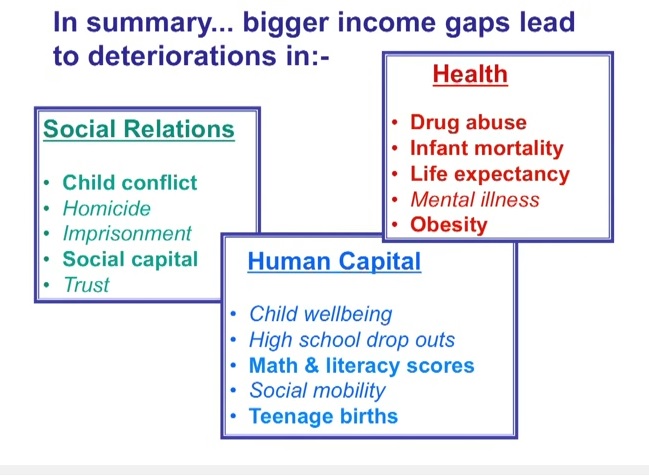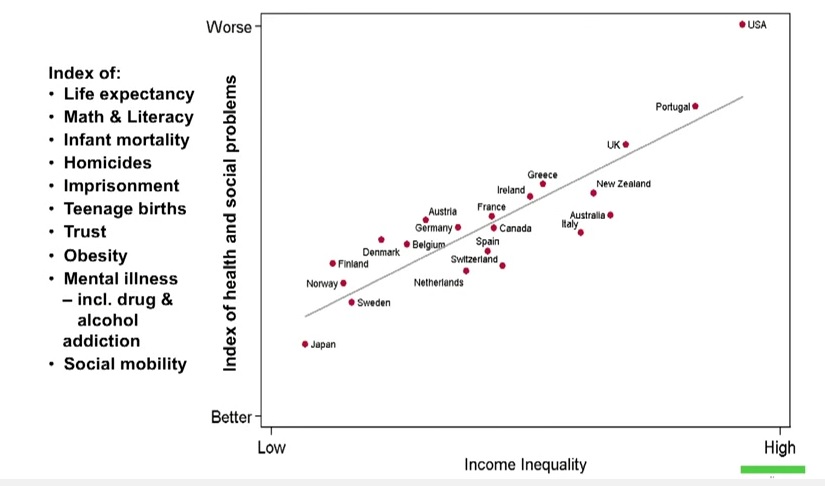A couple weeks ago, we started a most interesting blog series based on a collection of videos posted by Inc.com that features 21 videos worth more than an MBA. It is a very intriguing idea, that spending time efficiently watching very smart videos could help you in your career. The videos are nothing short of amazing! It is incredible what you can learn from these insights in 17 – 20 minute Ted Talk videos. We recapped the first 3 videos on the list that all talked about motivation. The next 3 videos were all about management. Last week’s 3 videos are on marketing. This week, the 3 videos in our series are all about economics.
- How Economic Inequality Harms Societies
Richard Wilkinson’s Ted Talk discusses How Economic Inequality Harms Societies. He looks at UN data on economic inequality and examines the effects on health, lifespan, and basic values like trust and what happens when there is a large gap between the rich and the poor. There are charts that show that when the well being of populations do not correlate to the average income levels. However, when there is a larger gap between the rich and the poor, countries have more problems in health, mental illness, violence, life values, high school dropout rates, social mobility.
Problems are worse in more unequal countries. A general social dysfunction exists in countries with more inequality. Not just the poor are negatively affected by economic inequality. Chronic stress is present in all economic categories of populations who have more inequality. The solution, he explains, is to look at the countries at the better end of index here (Japan, Sweden, Norway) and look at how they achieve more economic equality and strive to adopt some aspects of their models to gain a better overall society.
- Learning From Dirty Jobs
You probably know Mike Rowe as television host and commentator. He hosts a television show called “Dirty Jobs”. In this Ted Talk, he talks about Learning From Dirty Jobs. He shares insights and observations about the nature of hard work, and how it’s been unjustifiably degraded in society today. You have to watch the video to hear his introduction about an episode of Dirty Jobs where he worked on a sheep farm in Colorado. He explains how that one episode changed how he looked at the show and life in general. People with dirty jobs are happier than you think, and happier than other professions that might be more “prestigious”. He’s learned that instead of following your passion to your profession, you have to just live it. Innovation without imitation is a waste of time. Manual laborers should not be punchlines, they should be honoured. The benefits of hard labor have been forgotten. Infrastructure is suffering and enrollment in trade schools is steadily declining. The infrastructure jobs are declining. These jobs should be celebrated so that people want to perform them and society and economy benefits as a whole.
- Rich People Don’t Create Jobs
Nick Hanauer presents his discussion “Rich People Don’t Create Jobs”. It was banned by TED, they decided not to post his speech because it was “too politically controversial” for their site. However, it is still important to take a look at it and heed his advice. The reason it is so controversial is that he contradicts the theory put out by the super-rich Americans and Republicans that if the riches’ taxes rise that job creation will go down. He has started many companies and can be counted among the super-rich, he s a Seattle-based entrepreneur. Fellow 1-percenters would not like what he has to say. He explains that we have had it backwards jobs are a consequence of an ‘eco-systemic feedback loop’ between businesses and customers and that when the middle class thrives, business grow, hire, and owners profit. In a capitalist economy, the true job creators are middle class consumers.Taxing the rich to make investments to help the middle class thrive is the best thing that the U.S. can do for the economy of all sectors.








